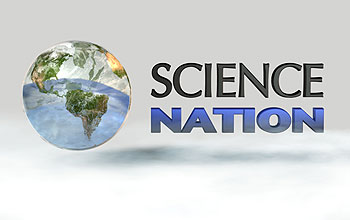Home > Press > National Science Foundation Releases Science Nation, a Video Series on Breakthroughs and Discoveries That Impact Our Lives
 |
| NSF's Science Nation video series will examine breakthroughs and possibilities for new discoveries. Credit: National Science Foundation |
Abstract:
Series created for NSF by former CNN senior science producers
National Science Foundation Releases Science Nation, a Video Series on Breakthroughs and Discoveries That Impact Our Lives
US | Posted on June 1st, 2009The National Science Foundation (NSF) today released the first in a series of video programs called Science Nation, which examine breakthroughs and the possibilities for new discoveries about our planet, our universe and ourselves. The video series is being created for NSF by former senior science producers at CNN, including Peter Dykstra and Kate Tobin. Each program features a two-minute and five-minute version.
"We are pleased to be able to educate and engage the American public about the diverse range of NSF-funded cutting-edge research that is going on every day," said Jeff Nesbit, director of NSF's Office of Legislative and Public Affairs. "Each week, Science Nation will take a dynamic, entertaining look at the research, and the researchers, that will change our lives."
The first episode, released on June 1, focuses on what we can learn from organisms that can live and thrive in frozen deserts or steaming-hot volcanic vents. These "freak" organisms may offer clues about possible life away from Earth. Subsequent episodes will be released every Monday and will be featured on www.nsf.gov/news/special_reports/science_nation/index.jsp. The videos can be downloaded from that site. Links to the videos can also be embedded on other sites.
Upcoming shows include:
* Tornadoes: research into perfecting how to anticipate tornadoes, and save lives in the process
* Artificial Retina: a totally-blind woman whose sight is partially restored through what is essentially a bionic eye
* Hydrogen Cars: advances in someday finding the "Holy Grail" of hydrogen-powered vehicles
* Cleaning up Rural China: coal-based cookstoves rule in rural China--an American grad student has potential solutions
* Greenland Ice Cores: research into ages-old ice cores from Greenland could preview what climate change may mean for us
In addition, the producers are developing programs about Emperor penguins, biofuels and atom-thin nanofibers.
####
About National Science Foundation
The National Science Foundation (NSF) is an independent federal agency that supports fundamental research and education across all fields of science and engineering. In fiscal year (FY) 2009, its budget is $9.5 billion, which includes $3.0 billion provided through the American Recovery and Reinvestment Act. NSF funds reach all 50 states through grants to over 1,900 universities and institutions. Each year, NSF receives about 44,400 competitive requests for funding, and makes over 11,500 new funding awards. NSF also awards over $400 million in professional and service contracts yearly.
For more information, please click here
Contacts:
Dana Topousis
National Science Foundation
(703) 292-7750
Copyright © National Science Foundation
If you have a comment, please Contact us.Issuers of news releases, not 7th Wave, Inc. or Nanotechnology Now, are solely responsible for the accuracy of the content.
| Related News Press |
News and information
![]() Researchers develop molecular qubits that communicate at telecom frequencies October 3rd, 2025
Researchers develop molecular qubits that communicate at telecom frequencies October 3rd, 2025
![]() Next-generation quantum communication October 3rd, 2025
Next-generation quantum communication October 3rd, 2025
![]() "Nanoreactor" cage uses visible light for catalytic and ultra-selective cross-cycloadditions October 3rd, 2025
"Nanoreactor" cage uses visible light for catalytic and ultra-selective cross-cycloadditions October 3rd, 2025
Preparing for Nano
![]() Disruptive by Design: Nano Now February 1st, 2019
Disruptive by Design: Nano Now February 1st, 2019
![]() How nanoscience will improve our health and lives in the coming years: Targeted medicine deliveries and increased energy efficiency are just two of many ways October 26th, 2016
How nanoscience will improve our health and lives in the coming years: Targeted medicine deliveries and increased energy efficiency are just two of many ways October 26th, 2016
![]() Searching for a nanotech self-organizing principle May 1st, 2016
Searching for a nanotech self-organizing principle May 1st, 2016
Possible Futures
![]() Spinel-type sulfide semiconductors to operate the next-generation LEDs and solar cells For solar-cell absorbers and green-LED source October 3rd, 2025
Spinel-type sulfide semiconductors to operate the next-generation LEDs and solar cells For solar-cell absorbers and green-LED source October 3rd, 2025
Academic/Education
![]() Rice University launches Rice Synthetic Biology Institute to improve lives January 12th, 2024
Rice University launches Rice Synthetic Biology Institute to improve lives January 12th, 2024
![]() Multi-institution, $4.6 million NSF grant to fund nanotechnology training September 9th, 2022
Multi-institution, $4.6 million NSF grant to fund nanotechnology training September 9th, 2022
Announcements
![]() Rice membrane extracts lithium from brines with greater speed, less waste October 3rd, 2025
Rice membrane extracts lithium from brines with greater speed, less waste October 3rd, 2025
![]() Researchers develop molecular qubits that communicate at telecom frequencies October 3rd, 2025
Researchers develop molecular qubits that communicate at telecom frequencies October 3rd, 2025
![]() Next-generation quantum communication October 3rd, 2025
Next-generation quantum communication October 3rd, 2025
![]() "Nanoreactor" cage uses visible light for catalytic and ultra-selective cross-cycloadditions October 3rd, 2025
"Nanoreactor" cage uses visible light for catalytic and ultra-selective cross-cycloadditions October 3rd, 2025
|
|
||
|
|
||
| The latest news from around the world, FREE | ||
|
|
||
|
|
||
| Premium Products | ||
|
|
||
|
Only the news you want to read!
Learn More |
||
|
|
||
|
Full-service, expert consulting
Learn More |
||
|
|
||








